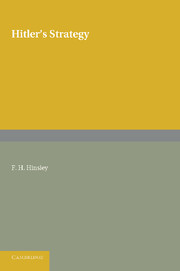Book contents
- Frontmatter
- Contents
- PREFACE
- Note on Sources and References
- CHAPTER I The German Navy, the Russian Pact, the British Problem and the Decision to Make War
- CHAPTER II The First Phase
- CHAPTER III The Invasion of Norway and the Fall of France
- CHAPTER IV An Invasion of England?
- CHAPTER V The Crucial Months, September to December 1940
- CHAPTER VI THE DECISION TO ATTACK RUSSIA
- CHAPTER VII North Africa, The Mediterranean and the Balkans in 1941
- CHAPTER VIII The Battle of the Atlantic in 1941
- CHAPTER IX German-Japanese Negotiations in 1941
- CHAPTER X 1942
- CHAPTER XI The End of the German Surface Fleet, January 1943
- CHAPTER XII Hitler's Strategy in Defeat
- APPENDIX A The German Surface Fleet
- APPENDIX B Germany's Infringements of the Naval Clauses of the Treaty of Versailles
- APPENDIX C The New U-Boats
- INDEX
CHAPTER V - The Crucial Months, September to December 1940
Published online by Cambridge University Press: 05 June 2016
- Frontmatter
- Contents
- PREFACE
- Note on Sources and References
- CHAPTER I The German Navy, the Russian Pact, the British Problem and the Decision to Make War
- CHAPTER II The First Phase
- CHAPTER III The Invasion of Norway and the Fall of France
- CHAPTER IV An Invasion of England?
- CHAPTER V The Crucial Months, September to December 1940
- CHAPTER VI THE DECISION TO ATTACK RUSSIA
- CHAPTER VII North Africa, The Mediterranean and the Balkans in 1941
- CHAPTER VIII The Battle of the Atlantic in 1941
- CHAPTER IX German-Japanese Negotiations in 1941
- CHAPTER X 1942
- CHAPTER XI The End of the German Surface Fleet, January 1943
- CHAPTER XII Hitler's Strategy in Defeat
- APPENDIX A The German Surface Fleet
- APPENDIX B Germany's Infringements of the Naval Clauses of the Treaty of Versailles
- APPENDIX C The New U-Boats
- INDEX
Summary
It was now that Hitler began to pay for his earlier mistakes. He had entered the war with too few U-boats, with too small a fleet. He had begun it with no military plans except that for the invasion of Poland; he had fought it for ten months without developing any that looked further than the defeat of France. His deficiency in this respect had been hidden by his successes in the Polish, Norwegian and French campaigns, and by the successive hopes that those campaigns encouraged—by the hope that France and Great Britain would stop short of war, then that they would accept a fait accompli when Poland was overrun, and then that Great Britain would make a settlement when France was defeated. None of these hopes had materialised; and when the last had faded, and when ‘Sea Lion’ was frustrated in its turn, it became only too obvious that the new situation was not one in which much hope of an early victory could be retained. He was still anxious, he was more anxious than ever, for an early settlement with Great Britain. But mixed with this anxiety, making it worse, there was now the fear that he would be unable either to inflict an early defeat on this country or to bring enough pressure to bear to induce her to accept his terms within a measurable time.
In these circumstances, if it was out of the question—and not in accord with Hitler's temperament—to do nothing, one obvious policy would have been to abandon the aim of an early end to the war and to concentrate on the Battle of the Atlantic, and on U-boat construction in particular. There was an undeniable logic in Raeder' s claim that Great Britain could be defeated ‘simply by cutting off her imports’: a complete siege of these islands would quickly destroy their ability to resist.
The U-boat campaign, neglected—even if for good reasons— until the defeat of France, had continued to be neglected, as a result of the decision to attempt the invasion of England, from July to the middle of September.
- Type
- Chapter
- Information
- Hitler's Strategy , pp. 86 - 123Publisher: Cambridge University PressPrint publication year: 2013

